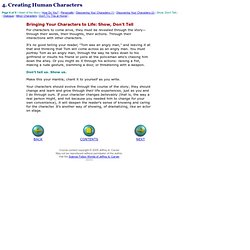

"Writing Science Fiction and Fantasy" by Jeffrey A. Carver. For characters to come alive, they must be revealed through the story—through their words, their thoughts, their actions.

Through their interactions with other characters. It's no good telling your reader, "Tom was an angry man," and leaving it at that and thinking that Tom will come across as an angry man. You must portray Tom as an angry man, through the way he talks down to his girlfriend or insults his friend or yells at the policeman who's chasing him down the alley. Or you might do it through his actions: raising a fist, making a rude gesture, slamming a door, or threatening with a weapon. Make this your mantra; chant it to yourself as you write. Your characters should evolve through the course of the story; they should change and learn and grow through their life experiences, just as you and I do through ours.
Flogging the Quill: In a recent edit, I pointed out some instances where I felt the author was telling versus showing.

I included examples of ways to show what had been told. She wrote to me and said, "I'm not sure I know how to 'show' rather than 'tell.'" That's not hard to understand. After all, we use that mode all the time in conversations with friends. "I was really surprised. " And it works. April told May how June had told Julie where to shove her opinion.
That's a necessary and effective use of telling. There are other times when it's the best thing to do. Jake pressed the little blue phone on his cell-phone keypad to end the call. Truly, that wasn't needed at all, and smacks of overwriting. Jake ended the call. The reader can easily imagine ending a call with a cell phone if they've ever used one, and even if they haven't used one, they've seen it on television.
So what's so bad about telling in a novel? You spot telling by looking for simple declarative sentences that tell the reader something. Ray. 25+ Pieces of Writing Software You Should Know About. David You left out Final Draft, which is the industry leader when it comes to scriptwriting. Frank Cantu Another highly popular writing application is Scrivener, although it’s Mac-only at the moment. Michelle I love using Q10 for writing. It’s a basic text editor that would probably fall under the heading “eliminate distractions” — I like to change the background to black and the font to a green or amber pixilated one that resembles the computer I had in the 80s. There’s not a ton of formatting options, but it works really well for just getting down the words. ( meghnak You have really provided a useful list of writing software, which are very much need for all writers in addition to their pencils and notebooks.
I’ll surely be trying to use the free ones first Thank you for sharing!